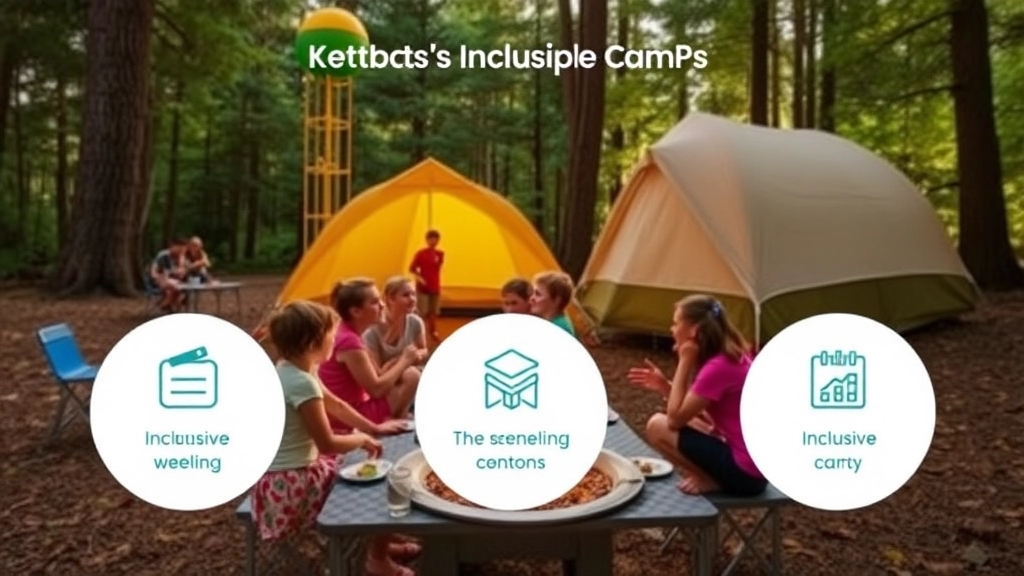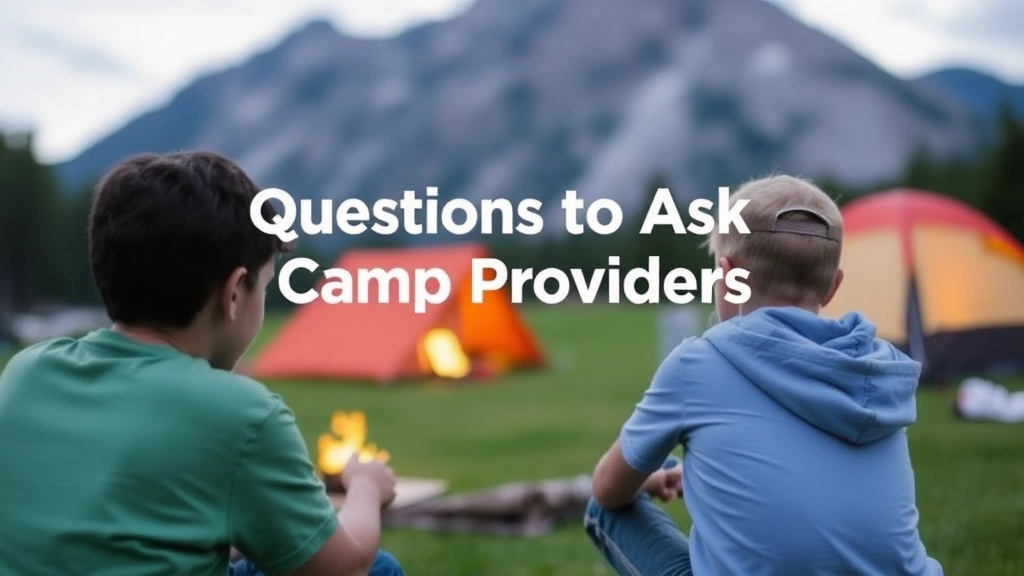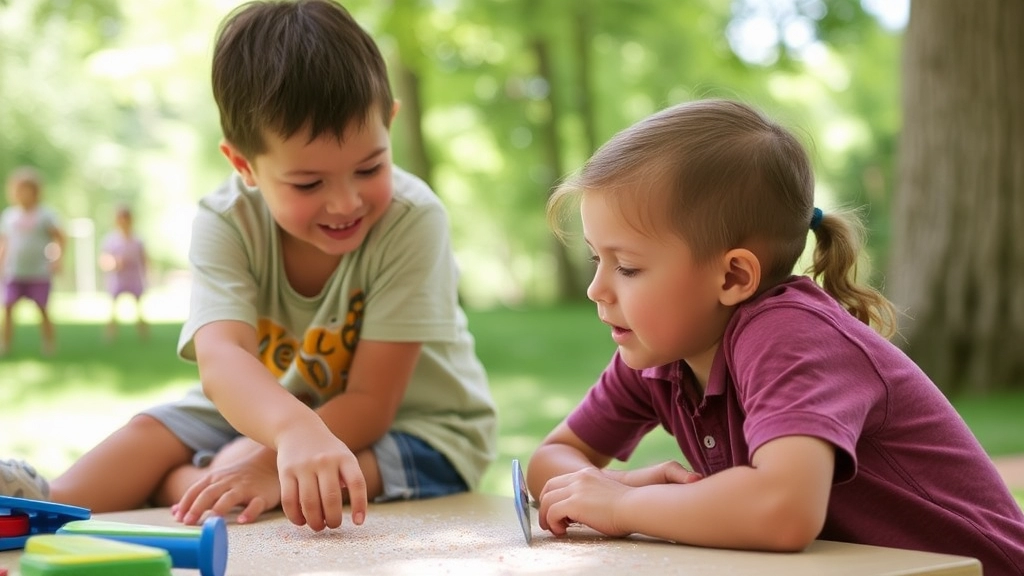Summer Camps for Special Needs: A Guide for Parents
Are you a parent of a child with special needs, wondering how to make the most of their summer? Look no further! In this article, we delve into the world of summer camps for special needs, exploring the various types available and the incredible benefits they offer. From boosting self-esteem to fostering independence, these camps are designed to provide a supportive and enriching environment for your child. We’ll guide you through the process of choosing the right camp, highlighting key features of inclusive camps and offering practical tips to prepare your child for this exciting adventure.
What to Expect
But that’s not all. We’ll also cover essential questions to ask camp providers, share heartwarming success stories from special needs camps, and provide information on financial assistance and scholarships to make these opportunities more accessible.
Types of Camps
- Specialized camps focusing on autism
- Camps for ADHD
- Camps for physical disabilities
- Inclusive camps that promote understanding and friendship
Whether you’re looking for specialized camps or inclusive options, this comprehensive guide has you covered. Get ready to discover how summer camps for special needs can be a game-changer for your child!
Types of Summer Camps for Special Needs
Alright, let’s dive into something that’s on every parent’s mind when summer rolls around: summer camps for special needs. You might be wondering, âWhat types are out there?â or âWill my child fit in?â Let’s break it down.
Different Types of Camps
Specialised Camps
These camps focus on specific needs, like autism, ADHD, or physical disabilities. They’re all about tailoring activities to what your child needs most.
- Autism Camps: Structured routines, sensory-friendly activities.
- ADHD Camps: High-energy, lots of movement, focus on social skills.
- Physical Disability Camps: Adaptive sports, accessible facilities.
Inclusive Camps
These camps mix children with and without special needs. The goal? To build friendships and understanding.
- Buddy Systems: Pairing up kids to encourage interaction.
- Adaptive Activities: Everyone gets to join in, no matter what.
Therapeutic Camps
These are all about growth and development, often with professional therapists on site.
- Speech Therapy Camps: Fun games that boost communication.
- Occupational Therapy Camps: Activities that improve daily living skills.
Day Camps vs Residential Camps
- Day Camps: Perfect if you’re not ready for overnight stays. Your child can enjoy camp activities during the day and be home by evening.
- Residential Camps: These offer a full immersion experience, fostering independence and new friendships.
Real Concerns, Real Solutions
You might be thinking, âWhat if my child feels overwhelmed?â or âWill they get the support they need?â These are valid concerns. The good news is, many camps have:
- Trained Staff: Professionals who understand and cater to special needs.
- Customised Programs: Tailored to each child’s abilities and interests.
Examples and Stories
Picture this: a parent shares how their child with autism thrived at a camp designed just for them. They came back more confident, with new friends and skills. It’s stories like these that highlight the impact of finding the right camp.
Finding the Right Fit
Choosing the right camp can feel like a mountain to climb, but it’s all about knowing what’s out there. Look for camps that align with your child’s interests and needs.
Remember, summer camps for special needs are more than just a break from school. They’re a chance for growth, fun, and making memories. Whether you’re leaning towards a specialised camp or an inclusive one, the right choice is out there.
If you’re looking for some great options, check out our guide on top summer track camps for all ages and skills or explore the top summer camping songs for all ages to get into the camp spirit.
Benefits of Camps for Children with Special Needs

Ever wondered if a summer camp is right for your child with special needs?
You’re not alone.
Parents like us have the same questions.
Let’s dive into why camps can be a game-changer.
1. Social Skills Development
Kids get to mingle with peers, make friends, and learn to navigate social situations.
2. Boost in Self-Esteem
Accomplishing new tasks and challenges boosts their confidence.
They realise they can do more than they ever thought possible.
3. Independence
Camp life encourages kids to be more self-reliant.
They learn to manage daily tasks without constant help.
4. Physical Activity
Most camps have a range of activities that keep kids moving.
It’s a fun way to stay active and healthy.
5. Emotional Growth
Being away from home helps kids manage emotions better.
They learn to cope with homesickness and adapt to new environments.
6. Tailored Support
Special needs camps have trained staff to provide the right support.
Your child gets the care they need while enjoying new experiences.
7. New Skills
From arts and crafts to sports, kids pick up new hobbies and skills.
These can be therapeutic and fun at the same time.
8. Sense of Belonging
Kids feel like they are part of a community.
They meet others who understand their challenges.
Real Stories, Real Impact
Take Sarah, for example.
Her son, diagnosed with autism, attended a special needs camp last summer.
He came back more confident, made new friends, and even picked up a love for painting.
Sarah said it was the best decision she ever made.
How to Choose the Right Camp
Choosing the right summer camp for your child with special needs can feel like a daunting task. I get itâthere are a million questions and worries swirling around in your head. Will the camp be able to cater to my child’s specific needs? Will they be safe? Will they have fun and make friends? Let’s break it down and make this process a whole lot easier.
Start with Your Child’s Needs
First things first, you need to consider your child’s unique needs. Here’s a quick checklist to help you out:
- Medical Requirements: Does your child need specific medical care or medication?
- Dietary Restrictions: Are there any food allergies or special diets to consider?
- Physical Accessibility: Does the camp have the facilities to accommodate mobility aids?
- Social Skills: How does your child interact with peers? Do they need extra support in social settings?
Research, Research, Research
Once you have a clear understanding of what your child needs, it’s time to do some digging. Look for camps that specialise in catering to special needs or have inclusive programs. Here’s what to look for:
- Reputation: Check reviews and testimonials from other parents. Word of mouth is gold.
- Staff Qualifications: Are the camp counsellors trained in special education or healthcare?
- Safety Protocols: What measures are in place to ensure your child’s safety?
- Activities: Are the activities suitable and engaging for your child?
Visit the Camp
If possible, visit the camp before making a decision. Seeing the facilities and meeting the staff can give you a much clearer picture. Here are some things to observe:
- Cleanliness: Is the camp clean and well-maintained?
- Staff Interaction: How do the staff interact with the children? Are they patient and understanding?
- Facilities: Are the facilities accessible and safe?
Ask the Right Questions
Don’t be shy about asking questions. This is your child’s well-being we’re talking about. Here are some questions to get you started:
- What is the staff-to-camper ratio?
- How do you handle emergencies?
- What kind of medical support is available on-site?
- How do you manage behavioural issues?
Trust Your Gut
At the end of the day, trust your instincts. If something feels off, it probably is. You know your child better than anyone else, so trust yourself to make the right decision.
Real-Life Example
I once spoke to a parent who was in the same boat. They were worried about sending their child, who has autism, to a summer camp. After doing their homework and visiting a few camps, they found one that felt right. The camp had a low staff-to-camper ratio, trained counsellors, and activities tailored to kids with autism. The result? Their child had the best summer ever and even made a few friends. If you’re looking for camps with similar inclusive programs, check out our guide on summer camp scholarships to find financial support options. Additionally, for more tips on ensuring a safe environment, explore our article on cabin and bunk safety.
Key Features of Inclusive Camps

Wondering what makes an inclusive camp truly special?
You’re not alone.
Many parents worry about finding the right fit for their child with special needs.
So, let’s break it down.
Personalised Support
Inclusive camps should offer personalised support.
This means:
- Tailored activities to match each child’s abilities
- One-on-one assistance when needed
- Flexible schedules to accommodate different needs
Why is this important?
Because it ensures every child can participate and feel valued.
Trained Staff
The staff at an inclusive camp should be trained in special needs education.
Look for:
- Certifications in special education
- Experience with various disabilities
- Ongoing training programs
Real talk: The right staff can make or break your child’s camp experience.
Adapted Activities
Activities should be adapted to be inclusive.
Think:
- Modified sports
- Sensory-friendly games
- Creative arts tailored to different abilities
Example: If your child loves swimming but has mobility issues, the camp should have accessible pools and trained lifeguards.
Peer Interaction
Inclusive camps foster peer interaction.
How?
- Mixed-ability group activities
- Buddy systems
- Social skills workshops
Story time: A parent shared how their child made a lifelong friend at camp because of these inclusive activities.
Safe Environment
Safety is non-negotiable.
Look for:
- Secure facilities
- Emergency protocols
- Low staff-to-camper ratios
Why it matters: Peace of mind for you and a safe space for your child.
Communication
Effective communication is key.
Expect:
- Regular updates
- Transparent policies
- Open lines of communication with staff
Pro tip: Ask about their communication methods during your initial inquiry.
Inclusive Culture
Finally, the camp should promote an inclusive culture.
This means:
- Respect for all abilities
- Encouragement of diversity
- Creating a welcoming atmosphere
Tips for Preparing Your Child for Camp
Heading off to camp can be a big deal for any child, but for a child with special needs, it can come with extra layers of worry and preparation. How do you get your child ready for this new adventure? Let’s dive into some practical tips to make the transition smoother.
Start with a Conversation
Talk to your child about what to expect at camp. Use simple, clear language and be honest about the daily routine, activities, and what they might experience.
- Visual Aids: Use pictures or videos of the camp to help them visualise.
- Role-Playing: Act out camp scenarios to make them feel more familiar.
Visit the Camp in Advance
If possible, take a trip to the camp before the start date. This can help your child get used to the new environment.
- Meet the Staff: Introduce your child to the camp counsellors and staff.
- Tour the Facilities: Show them where they’ll sleep, eat, and play.
Pack Smartly
Make a checklist of essentials and involve your child in the packing process. This can help them feel more in control and less anxious.
- Comfort Items: Pack a favourite toy, blanket, or item that provides comfort.
- Label Everything: Ensure all items are clearly labelled with your child’s name.
Practice Independence Skills
Help your child develop the skills they’ll need at camp. This could include:
- Dressing Themselves: Practice putting on and taking off clothes.
- Personal Hygiene: Teach them how to manage basic hygiene tasks.
Create a Communication Plan
Set up a reliable way for your child to stay in touch with you.
- Scheduled Calls: Agree on specific times for phone calls.
- Letters and Emails: Encourage them to write letters or send emails.
Prepare for Emotional Ups and Downs
It’s normal for children to feel homesick or anxious. Prepare them for these feelings and discuss coping strategies.
- Reassurance: Let them know it’s okay to feel this way and that it will pass.
- Positive Reinforcement: Focus on the fun aspects of camp and the new friends they’ll make.
Health and Safety Preparations
Ensure the camp is aware of any medical needs or dietary restrictions.
- Medication Management: Make sure the camp staff knows how to administer any medications.
- Emergency Contacts: Provide a list of emergency contacts and medical information.
Real-Life Example
Sarah’s Story: Sarah, a 10-year-old with autism, was anxious about going to camp. Her parents used visual aids and role-playing to prepare her. They visited the camp together, met the staff, and packed her favourite teddy bear. Sarah had a few moments of homesickness but quickly adapted and made new friends. Her parents’ preparation made all the difference.
For more tips on making camp a memorable experience, check out our inspirational summer camp quotes and our ultimate packing checklist.
Questions to Ask Camp Providers

Choosing the right summer camp for your child with special needs can be daunting. You want them to have fun, be safe, and get the support they need. So, what should you ask camp providers to make sure it’s the right fit?
1. What Types of Special Needs Do You Cater To?
Not all camps are equipped to handle every type of special need. Ask if they have experience with your child’s specific needs. Do they cater to physical disabilities, autism, ADHD, or other conditions? Knowing this will help you gauge if they’re the right fit.
2. What Qualifications Do Your Staff Have?
The people who will be looking after your child need to be well-trained. Are the staff certified in special education or therapy? Do they have first aid training? Make sure they’re not just well-meaning volunteers but qualified professionals.
3. What Is the Camper-to-Staff Ratio?
Your child will need more attention than others. A low camper-to-staff ratio ensures they get the care they need. Ask for specifics. Is it one staff member for every two campers? Or is it one for every five?
4. How Do You Handle Emergencies?
Emergencies can happen. How prepared are they? Ask about their emergency protocols. Do they have a nurse or medical professional on-site? What’s their plan for medical emergencies?
5. What Activities Are Available?
Your child should have fun too. Ask about the activities they offer. Are they inclusive? Do they have adaptive sports or arts and crafts? Make sure there’s something your child will enjoy.
6. How Do You Communicate with Parents?
You’ll want updates, right? Ask how they keep parents in the loop. Do they provide daily updates? Weekly summaries? This will give you peace of mind.
7. Can You Provide References?
A good camp should have happy parents willing to vouch for them. Ask for references. Talk to other parents. Get their honest opinions.
8. What Is the Cost and What Does It Include?
Money matters. Ask about the cost and what it covers. Are meals included? What about special equipment? Make sure there are no hidden fees.
9. Do You Offer Financial Assistance or Scholarships?
Many camps offer financial help. Ask if they have scholarships or sliding scale fees. This can make a big difference.
10. What Is Your Policy on Behaviour Management?
Every child can have a rough day. Ask how they handle behavioural issues. Do they have a positive reinforcement system? What’s their policy on time-outs or other disciplinary actions?
Success Stories from Special Needs Camps
Ever wondered if a summer camp could genuinely make a difference for your child with special needs? Trust me, you’re not alone. Many parents grapple with the same questions and uncertainties. But guess what? The impact of these camps can be nothing short of transformative. Let’s dive into some real-life success stories that will not only warm your heart but also give you a clearer picture of the incredible benefits these camps offer.
From Isolation to Inclusion
Take Sarah, for instance. Sarah, a 10-year-old girl with autism, had always struggled with social interactions. Her parents were hesitant but decided to enrol her in an inclusive summer camp. Within just a week, Sarah began to show signs of improvement. She started making eye contact, participating in group activities, and even made a couple of friends. Her mum said, “It was like watching a flower bloom. The camp provided a safe space for her to be herself and grow.”
Building Confidence and Independence
Then there’s Jake, a 12-year-old boy with Down syndrome. Jake’s parents were always concerned about his lack of independence. They found a camp that specialised in life skills for children with special needs. Over the summer, Jake learned to dress himself, prepare simple meals, and even manage his own schedule. His dad shared, “The camp was a game-changer. Jake came back more confident and independent. It’s been amazing to see him take on new challenges.”
Overcoming Physical Challenges
Let’s not forget about Emily, a 14-year-old with cerebral palsy. Emily had always been reluctant to participate in physical activities due to her condition. Her parents found a specialised camp with adaptive sports programs. By the end of the summer, Emily had not only tried swimming and horseback riding but had also developed a newfound love for archery. Her parents were over the moon, saying, “Emily’s self-esteem skyrocketed. She realised that her physical limitations didn’t define her.”
Creating Lifelong Friendships
One of the most remarkable stories comes from a camp counsellor who shared the story of a group of children with various special needs. These kids formed a tight-knit group over the summer, supporting each other through challenges and celebrating each other’s successes. The counsellor said, “Watching them bond was incredible. They created friendships that will last a lifetime. It was a reminder that everyone, regardless of their abilities, needs a sense of belonging.”
Why These Stories Matter
These stories aren’t just feel-good anecdotes; they highlight the transformative power of summer camps for children with special needs. They show that with the right environment and support, these children can achieve milestones that might have seemed out of reach. The keyword here is “success stories from special needs camps,” and it’s clear that these camps can offer life-changing experiences.
If you’re considering a summer camp for your child, take these stories as a testament to the incredible potential for growth and development. And remember, you’re not just sending your child to camp; you’re giving them an opportunity to thrive.
Ready to explore more? Check out our guide on summer camp activities that combine fun and learning and our budget tips for summer camps.
Financial Assistance and Scholarships for Camps
Worried about the cost of sending your child to a special needs camp? You’re not alone.
Many parents face this dilemma every summer.
But guess what? There are financial assistance and scholarships available to make camps more affordable.
Let’s dive in.
Why Financial Assistance Matters
Sending your child to a specialised camp can be pricey.
But the benefits are worth it.
Camps provide a supportive environment, tailored activities, and social opportunities.
The right camp can make a world of difference for your child.
Types of Financial Assistance
- Scholarships:
- Many camps offer scholarships specifically for children with special needs.
- Check the camp’s website or contact them directly for details.
- Grants:
- Look into grants from organisations dedicated to supporting special needs children.
- Examples include The National Autistic Society and Cerebra.
- Charitable Organisations:
- Groups like Variety, the Children’s Charity, often provide funding for camp experiences.
- Local charities can also be a great resource.
- Government Programs:
- Some local councils offer funding for special needs activities.
- It’s worth checking with your council to see what’s available.
How to Apply for Financial Assistance
- Research:
- Start by making a list of camps and organisations that offer financial help.
- Use keywords like “special needs camp scholarships” or “financial aid for special needs camps.”
- Prepare Your Documents:
- Gather all necessary documents like proof of income, medical records, and personal statements.
- Each application will have different requirements, so read carefully.
- Apply Early:
- Scholarships and grants often have deadlines.
- Applying early increases your chances of securing funding.
- Follow Up:
- After submitting your application, follow up to ensure it’s been received and to ask about the timeline.
Real Stories
Sarah, a mum from Manchester, shared her experience:
“Last summer, we sent our son to a special needs camp thanks to a scholarship from Variety. The application process was straightforward, and the camp made a huge impact on his social skills.”
Final Thoughts
Don’t let cost be a barrier.
With a bit of research and effort, you can find financial assistance and scholarships.
Giving your child the camp experience they deserve is possible.
For more tips on choosing the right camp, check out our section on how to choose the right camp.
And if you have any questions, feel free to reach out.
We’re here to help.
FAQs on Summer Camps for Children with Special Needs
What are the benefits of sending my child with special needs to a summer camp?
Summer camps offer numerous benefits for children with special needs, including social skills development, a boost in self-esteem, increased independence, physical activity, emotional growth, tailored support, new skills, and a sense of belonging.
How do camps help in developing social skills for children with special needs?
Children get to mingle with peers, make friends, and learn to navigate social situations, which enhances their social skills.
Will my child become more independent at camp?
Yes, camp life encourages kids to be more self-reliant by teaching them to manage daily tasks without constant help.
What types of activities are available at these camps?
Activities range from arts and crafts to sports, all designed to be inclusive and adapted to the abilities of each child, ensuring they are both therapeutic and fun.
How are the staff at these camps trained?
Staff at inclusive camps are usually trained in special needs education, holding certifications and experience in various disabilities, and participating in ongoing training programs.
What should I look for in a safe camp environment?
Look for secure facilities, emergency protocols, and low staff-to-camper ratios to ensure a safe environment for your child.
How do camps ensure a sense of belonging for my child?
Inclusive camps foster a sense of community where children feel part of a group and meet others who understand their challenges.
What questions should I ask camp providers?
Ask about the types of special needs they cater to, staff qualifications, camper-to-staff ratios, emergency protocols, available activities, communication methods, references, cost, financial assistance, and behavior management policies.
Can you provide an example of a success story?
One parent, Sarah, shared that her son, diagnosed with autism, attended a special needs camp and returned more confident, with new friends and a newfound love for painting. She described it as the best decision she ever made.
What makes an inclusive camp truly special?
Inclusive camps offer personalized support, trained staff, adapted activities, peer interaction, a safe environment, effective communication, and an inclusive culture that respects all abilities and encourages diversity.
How do camps communicate with parents?
Camps often provide regular updates, maintain transparent policies, and keep open lines of communication with parents to ensure peace of mind.
References
-
Autism Speaks: Autism and Summer Camp
-
Verywell Family: Summer Camps for Kids with Special Needs
-
CDC: Summer Camps for Children with Special Needs

